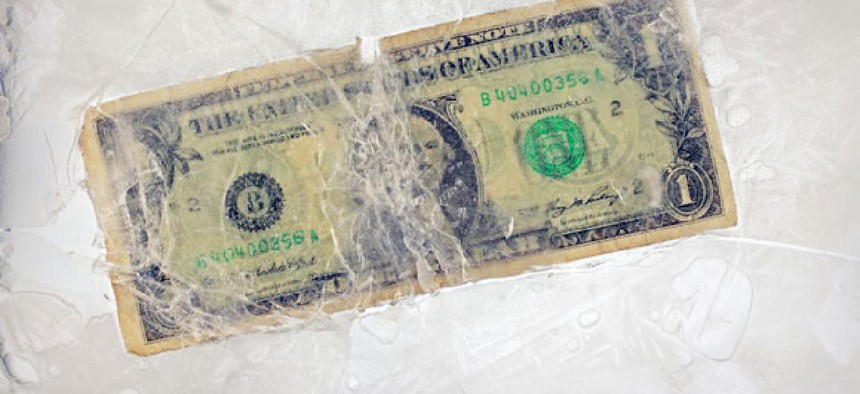
Zoran Ratkovic/Shutterstock.com
House Votes to Extend Federal Pay Freeze
Bill prolongs current across-the-board salary freeze for feds and lawmakers through 2013.
This story has been updated with additional comment.
The House on Friday voted to freeze the pay of federal employees and lawmakers through 2013.
The legislation, sponsored by Rep. Ron DeSantis, R-Fla., prolongs the current across-the-board pay freeze for civilian government employees through the end of the year. President Obama issued an executive order on Dec. 27, 2012, that would end the two-year salary freeze on March 27 -- when the current continuing resolution expires -- and give civilian federal workers a 0.5 percent raise in 2013. DeSantis’ move to block the order also applies to lawmakers, but Congress already voted to freeze its pay in 2013 in the fiscal cliff legislation signed into law in January.
H.R. 273 would effectively overturn Obama's December executive order if it becomes law.
House lawmakers took two days to debate and vote on the measure, which the leadership fast-tracked to the floor, bypassing regular order. The legislation passed, mostly along party lines, 261 to 154.
Democrats used the hour-long floor debate Thursday and Friday on the bill to defend federal workers, but also to accuse Republicans of failing to avoid sequestration, which is scheduled to begin March 1. Republicans reiterated that they have already passed legislation to avert the automatic spending cuts. Republicans with many federal employees in their districts also defended government workers. Rep. Frank Wolf of Virginia sent letters this week to his Republican colleagues urging them to oppose H.R. 273. Wolf and Rep. Frank LoBiondo, R-N.J., spoke out against the legislation during floor debate on Friday.
Supporters of the bill pointed out the extension of the across-the-board federal civilian pay freeze would not affect merit pay increases or those associated with promotions. Rep. Darrell Issa, R-Calif., said the freeze would amount to $274 less per employee for the rest of the fiscal year. He said many employees still will be eligible for a step increase, which would average about $1,600 for 2013. “Year after year the federal workforce has received step increases, other pay increases, and with the exception of a relatively limited pay freeze done under President Obama’s executive order, they in fact have received consistent pay increases and their benefits have been maintained.” Issa said extending the freeze represented “a very small sacrifice.”
Rep. Elijah Cummings criticized the House for taking up measures that make Americans less financially secure. “One of the arguments that we consistently hear is that we need certainty, people need to know exactly what’s going to happen in their lives,” said the Maryland Democrat, who is the ranking member of the Oversight and Government Reform Committee. “We’ve heard that argument over and over again, yet when it comes to federal employees, we leave them in the lurch, not knowing how much the next paycheck will be.”
Nixing an across-the-board pay increase for feds this year would save the government $11 billion over a decade, according to the nonpartisan Congressional Budget Office. Rep. Rob Woodall, R-Ga., said on Thursday that agencies could use the savings from extending the pay freeze through 2013 for other federal programs. The money saved would not go toward overall deficit reduction or replacing any part of the sequester.
The White House Wednesday night said it opposed the bill, arguing that feds have been subject to a pay freeze since 2011. That freeze is expected to save $60 billion over the next decade. “Federal civilian employees are central to the federal government’s success in serving the American people,” the statement of administration policy said. “They assure the safety of this country’s food and airways, defend the homeland, provide health care to the nationˈs veterans, search for cures to devastating diseases, and provide vital support to our troops at home and abroad.” The policy statement did not, however, threaten a veto on the bill. Federal employee unions also voiced opposition to H.R. 273.
“If Congress cancels the very modest 0.5 percent pay raise proposed by the president, federal employees and their families will take an additional hit, to the tune of over $11 billion, for a grand total of $114 billion in reduced compensation. Enough is enough!” said Joseph Beaudoin, president of the National Active and Retired Federal Employees Association. “It is time Congress found other ways to reduce the deficit than to continually take from those who dedicate their lives to public service. Continuing the pay freeze will only exacerbate the problem of an underpaid federal workforce and weaken the quality of our federal civil service over time.”
National Treasury Employees Union President Colleen Kelley decried the vote as a political ploy and said lawmakers should be working to avoid the sequester, not to further freeze federal pay. “The vote today to extend the federal employee pay freeze is yet another gratuitous attack on working Americans orchestrated by House leadership,” Kelley said. “Federal employees who are into the third year of a pay freeze guard our borders, keep our food safe, care for the most vulnerable, and so much more,” she added.
House GOP leaders hailed the passage of H.R. 273. “Until Washington gets serious about addressing its spending problem, and stops making it harder for small businesses to hire, the federal government shouldn’t be giving itself an across-the-board pay raise,” Speaker John Boehner, R-Ohio, said in a statement. “The president’s pay hike is extremely reckless in the face of sequestration,” said House Majority Leader Eric Cantor, R-Va. “The administration should be looking for ways to reduce spending not increase it.”
The Democratic-controlled Senate is unlikely to take up the pay freeze bill.
(Image via Zoran Ratkovic/Shutterstock.com)
NEXT STORY: Give the Gift of Cash







